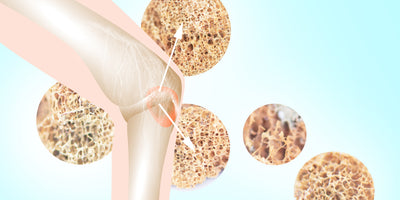
The Role of Prebiotics in Supporting a Healthy Metabolism
Introduction
Prebiotics, distinct from probiotics, are dietary fibres that the human body cannot digest. They nourish beneficial gut bacteria, fostering a supportive environment for these microbes to thrive. Prebiotics are integral to maintaining a balanced intestinal ecosystem and are found in foods such as chicory root, garlic, onions, and bananas. Understanding their role empowers us to influence bodily functions beyond digestion through our diet, enhancing our overall wellness.
Prebiotics emerged from the need to understand the impact of diet on the microbiota residing in our gastrointestinal tract. As research in this field has expanded, it has become apparent that prebiotics help maintain the health and balance of our gut flora, which in turn impacts our overall health. The health of our gut microbiome is linked to various outcomes, from mental health and immune response to metabolic processes. Prebiotics have been found to significantly reduce the risk of chronic diseases, further highlighting their importance in maintaining long-term health.
Promoting a healthy microbiome through prebiotic intake can profoundly affect the body's metabolic health. This includes improved nutrient absorption, glucose regulation, and weight management. This article delves into each aspect, revealing how integral prebiotics are to our health and how simple dietary choices can significantly influence our body's core functions, such as maintaining a healthy weight and managing blood sugar levels.
Mechanisms of Prebiotic Action
Prebiotics function primarily by enhancing the growth and activity of beneficial bacteria in the gut. This action is crucial because these bacteria play significant roles in metabolic health, from breaking down nutrients for absorption to synthesising essential vitamins. The fermentation of prebiotics by these bacteria produces short-chain fatty acids (SCFAs), pivotal in nourishing colon cells and maintaining gut barrier integrity. This process prevents pathogens and toxins from entering the bloodstream, promoting a healthy immune system.
Moreover, the production of SCFAs has systemic effects, including influencing lipid metabolism and insulin sensitivity, which are critical components of metabolic health. These acids can also modulate the immune response and reduce inflammation, directly linking gut health to chronic diseases like obesity and type 2 diabetes. Understanding these mechanisms is essential for appreciating how dietary fibres like prebiotics can have such wide-ranging health benefits.
The indirect effects of prebiotics also include altering the pH of the gut, which can inhibit the growth of harmful bacteria while promoting the survival of friendly bacteria. By improving the overall composition of the gut microbiome, prebiotics help create a more resilient digestive system capable of dealing with external disturbances such as antibiotics and dietary changes. This resilience is critical to maintaining long-term health and preventing metabolic and digestive disorders.
Prebiotics and Gut Health
A healthy gut is a linchpin for overall well-being, influencing everything from mood and energy levels to immunity and chronic disease risk. Prebiotics contribute to gut health by boosting the growth of beneficial bacteria, which are instrumental in maintaining a balanced gut microbiota. A balanced microbiota not only aids in digestion and nutrient absorption but also helps manage gut inflammation and integrity, which are crucial for preventing metabolic diseases. This underscores the importance of maintaining a healthy gut for overall wellness.
Digestive health benefits greatly from the regular intake of prebiotics. These fibres can help manage symptoms of various digestive disorders, such as irritable bowel syndrome (IBS) and inflammatory bowel disease (IBD). By enhancing the growth of health-promoting bacteria, prebiotics help restore the balance of gut flora, which stress, antibiotics and poor diet can disrupt. The result is less bloating, fewer gastrointestinal infections, and improved overall digestive function.
Additionally, a well-fed microbiome can better produce vitamins and enzymes critical for digestion and metabolism. This includes the production of vitamin K and B vitamins, which are vital for energy metabolism and red blood cell production. Prebiotics' role in supporting these functions underscores their importance in a healthy diet and highlights the interconnectedness of gut health and metabolic function.
Impact on Nutrient Absorption
Prebiotics enhance the body's ability to absorb essential nutrients, a cornerstone of metabolic health. Prebiotics such as calcium and magnesium can strengthen bone density and overall skeletal health by improving mineral absorption. This is particularly important for populations at risk of osteoporosis and other bone-related conditions. The increased absorption of these minerals is facilitated by creating a favourable pH environment in the gut, which solubilises minerals, making them more available for absorption.
Furthermore, the fermentation of prebiotics by gut bacteria leads to the production of SCFAs, which have been shown to enhance the absorption of electrolytes, such as sodium and potassium. These electrolytes are vital for cellular function and play crucial roles in fluid balance, nerve transmission, and muscle function. Enhanced absorption of these ions can help improve physical performance, prevent muscle cramps, and maintain cellular health.
Besides mineral absorption, prebiotics also influence the bioavailability of antioxidants found in the diet, such as polyphenols. These compounds are typically bound in the plant matrix and are released and activated by the action of gut bacteria. The antioxidants can then exert their effects, reducing oxidative stress and inflammation, further supporting metabolic health and reducing the risk of chronic diseases.
Prebiotics and Glucose Regulation

Prebiotics are pivotal in maintaining healthy blood sugar levels, an essential aspect of metabolic health. They do this by influencing the gut microbiota, affecting glucose metabolism. Studies have shown that the fermentation of prebiotics by beneficial gut bacteria can improve insulin sensitivity, making the body's cells more responsive to insulin and helping to lower blood glucose levels post-meal. This is crucial for preventing the onset of metabolic syndrome and type 2 diabetes.
In addition to improving insulin sensitivity, prebiotics can help modulate the release of hormones involved in hunger and satiety, such as ghrelin and peptide YY. By influencing these hormones, prebiotics can help regulate appetite and reduce overall calorie intake, which is beneficial for glucose management and weight control. This hormonal interaction helps manage existing metabolic issues and can prevent their development by maintaining a healthy weight and reducing visceral fat.
Moreover, the impact of prebiotics on glucose regulation can also be linked to their effect on inflammation. Chronic low-grade inflammation is a known contributor to insulin resistance, and by reducing gut and systemic inflammation, prebiotics help improve glucose metabolism. This highlights the multifaceted ways prebiotics can influence health, extending far beyond the gut to affect systemic metabolic functions and long-term health outcomes.
Weight Management and Prebiotics
The obesity epidemic continues to pose significant health challenges worldwide, and dietary strategies to manage weight are increasingly important. Prebiotics offer a promising avenue for weight management through their multifaceted influence on gut health and metabolism. Prebiotics help regulate energy homeostasis and fat storage by promoting beneficial bacteria growth. The SCFAs produced from prebiotic fermentation play a role in lipid metabolism, potentially reducing fat accumulation in the liver and adipose tissue.
Prebiotics also impact satiety and appetite regulation, which are crucial for weight management. The production of SCFAs has been linked to the secretion of hormones that influence satiety, helping to reduce overall calorie intake. This mechanism can be particularly beneficial in diet-based weight management programs, as it helps reduce the feelings of hunger that often accompany calorie-restricted diets.
Furthermore, the influence of prebiotics on the gut-brain axis should be considered. The gut-brain axis is a communication network that links the emotional and cognitive centres of the brain with peripheral intestinal functions. Through their action on the gut microbiota, prebiotics can send signals to the brain that impact mood and anxiety, which are often linked to eating behaviours and preferences. By modulating these neural pathways, prebiotics promote healthier eating habits and attitudes towards food.
Prebiotics in Reducing Inflammation
Chronic inflammation is a critical factor in the development of metabolic syndrome, which includes a cluster of conditions such as high blood sugar, increased blood pressure, excess body fat around the waist, and abnormal cholesterol levels. Prebiotics can play a significant role in reducing inflammation through their modulation of gut bacteria. By enhancing the production of SCFAs, prebiotics help fortify the gut barrier, reducing the likelihood of endotoxin leakage into the bloodstream, which is a known cause of systemic inflammation.
The reduction of inflammation via prebiotic intake can have wide-reaching effects on overall health, including the improvement of cardiovascular health and reduction in the risk of chronic diseases such as type 2 diabetes and obesity. Inflammatory pathways are common underlying factors in these conditions, and managing inflammation through diet can be a key component of preventive health strategies.
Additionally, the role of prebiotics in immune modulation extends to the regulation of immune cells that target inflammatory pathways. By influencing gut-associated lymphoid tissue (GALT), prebiotics help promote an immune response that is balanced, not overly prone to triggering inflammation in response to non-harmful antigens. This balanced immune response is crucial not only for preventing unnecessary inflammatory reactions but also for ensuring that the body can effectively respond to pathogens.
Cardiovascular Health
The benefits of prebiotics extend to cardiovascular health, primarily through their impact on cholesterol levels and blood pressure regulation. The SCFAs produced from the fermentation of prebiotics by gut bacteria have been shown to inhibit the synthesis of cholesterol in the liver, leading to lower levels of LDL cholesterol and higher levels of HDL cholesterol in the blood. This favourable cholesterol profile is associated with a reduced risk of heart disease.
Prebiotics also contribute to cardiovascular health by influencing blood pressure. The SCFAs can help improve blood vessel health, enhancing their ability to dilate and contract, which can lead to better blood pressure control. Additionally, the anti-inflammatory effects of prebiotics can reduce the risk of atherosclerosis, a major contributor to cardiovascular disease, by preventing the buildup of plaque in the arteries.
Moreover, the overall impact of prebiotics on weight management also contributes to cardiovascular health. Excess body weight is a significant risk factor for heart disease, and by aiding in weight control, prebiotics help reduce the strain on the heart and blood vessels. This multifaceted approach to improving cardiovascular health underscores the importance of dietary fibres like prebiotics in maintaining heart health and preventing related diseases.
Prebiotics and Immune Function
A robust immune system is integral to preventing infections and managing long-term health. Prebiotics enhance immune function by supporting the health of the gut, where a significant portion of the body's immune cells are located. By fostering a healthy gut microbiota, prebiotics help ensure an effective immune response. The SCFAs produced by the fermentation of prebiotics play a role in modulating the immune system, enhancing its ability to fight off pathogens while preventing overreaction that can lead to autoimmune diseases.
The impact of prebiotics on the immune system is also seen in their ability to enhance the integrity of the gut barrier. A strong gut barrier prevents the entry of harmful pathogens and toxins into the bloodstream, which can trigger immune responses and inflammation. By strengthening this barrier, prebiotics help maintain a more controlled and less inflammatory immune response.
Furthermore, the role of prebiotics in reducing systemic inflammation indirectly supports immune health. Chronic inflammation can suppress the immune system, making it less effective at responding to real threats. By reducing inflammation, prebiotics help restore immune function and improve the body's ability to defend itself against infections and disease.
Future Research and Clinical Applications
The potential of prebiotics in health and disease management is vast, with ongoing research continuing to uncover new benefits and mechanisms of action. Future studies are focused on identifying specific prebiotics that may have targeted effects on various health conditions, from obesity and type 2 diabetes to cardiovascular diseases and beyond. This research is crucial for developing more effective dietary recommendations and therapeutic applications that can be personalised based on individual health needs and microbiome compositions.
Moreover, the integration of prebiotics into clinical practice involves understanding their interactions with other dietary components and medications. This includes the timing of prebiotic intake, its combination with probiotics (synbiotics), and its role in the diet of patients with specific health conditions. As our understanding of the gut microbiome grows, so too does our potential to use prebiotics as a tool for preventive health and therapeutic intervention.
Emerging research also explores the role of prebiotics in non-gastrointestinal diseases, such as mental health disorders and autoimmune diseases. The gut-brain axis and the systemic effects of gut-derived metabolites offer exciting new pathways for understanding and treating a wide range of conditions. The future of prebiotic research holds promise for further integrating nutrition with medical practice, emphasising the role of diet in maintaining health and treating disease.
Summary
Introduction to Prebiotics:
- Prebiotics are indigestible fibres that nourish beneficial gut bacteria.
- Found in foods like chicory root, garlic, onions, and bananas.
- They play a crucial role in maintaining a balanced gut microbiome and overall health.
- Prebiotics enhance the growth of beneficial gut bacteria, improving metabolic health.
- They promote the production of short-chain fatty acids (SCFAs), which are vital for colon health and immune function.
- Prebiotics help regulate the gut pH, inhibit harmful bacteria and support a healthy digestive system.
- Boost gut health by increasing beneficial bacteria, which enhances digestion and nutrient absorption.
- Help manage symptoms of digestive disorders like IBS and IBD.
- Support the production of essential vitamins and improve gut flora balance.
- Enhance the absorption of key minerals like calcium and magnesium, which are crucial for bone health.
- Improve the bioavailability of electrolytes and antioxidants, which support cellular and overall health.
- Influence gut microbiota to improve insulin sensitivity and glucose metabolism.
- Regulate hunger and satiety hormones, aiding in weight management and reducing the risk of type 2 diabetes.
- Aid in obesity prevention by reducing appetite and promoting satiety through SCFA production.
- Influence the gut-brain axis, potentially improving eating behaviours and promoting a healthier relationship with food.
- Reduce systemic inflammation by strengthening the gut barrier and modifying the gut bacteria.
- Lower the risk of metabolic syndrome and improve cardiovascular health.
- Lower bad LDL cholesterol and increase good HDL cholesterol.
- Improve blood pressure and reduce the risk of heart disease through enhanced blood vessel function.
- Enhance immune system performance by supporting gut health, where much of the immune system is located.
- Strengthen the gut barrier to prevent pathogen entry and reduce inflammation.
- Ongoing studies aim to further understand the specific benefits of prebiotics and develop personalised dietary recommendations.
- Potential for prebiotics to impact a broad range of health conditions, including mental health and autoimmune diseases.
Prebiotic Information
For everything you need to know about prebiotics and prebiotic supplements, check out our comprehensive information page here.
Prebiotic
Biosphere Nutrition’s Prebiotic Powder is a unique blend of Sunfiber® and Black Elderberry Extract, designed to nurture gut health and support the immune system. This easy-to-mix, great-tasting formula ensures optimal absorption and digestive comfort. To learn more about our Prebiotic, check out the product page here.







